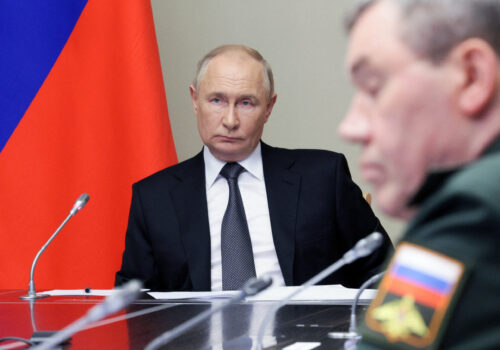During their recent visit to Kyiv, United States Senators Richard Blumenthal (D-CT) and Lindsey Graham (R-SC) made news with pledges to bolster US support for Ukraine, including by telling Ukrainian President Volodymyr Zelenskyy that “we’re going to fight for another supplemental [aid package] before the end of the calendar year.”
After the last slog for supplemental assistance to Ukraine ended in April 2024, any new package is likely to face a far smoother path through Congress thanks to more political cover for congressional Republicans and increasing public support for aid. But having to debate whether the United States should help Ukraine each year isn’t sustainable. Instead, it’s time the United States matched its allies by passing meaningful long-term support for Ukraine. If executed properly, the Blumenthal-Graham proposal could soon make that a reality.
Talk of another supplemental aid package may seem surprising to some. A $61 billion package was passed just a few months ago, after all. But that package was never meant to last long. The Biden administration originally asked in August 2023 for a short-term supplemental to cover the rest of the year, with the expectation of more substantial aid coming in early 2024.
But the White House misjudged Capitol Hill, and the issue became subject to extended delays. The updated supplemental aid request that came from the White House in October 2023, almost identical to the package that eventually passed in April 2024, was instead designed to provide for military assistance to Ukraine until just after the November 2024 elections.
While the April 2024 supplemental is billed as a $61 billion package, the majority of that figure is comprised of long-term funding for defense production in the US and financial assistance to Ukraine. Only $7.8 billion was appropriated for Presidential Drawdown Authority, the primary mechanism used by the United States to send weapons to Ukraine. If the president doesn’t use it all, it could soon expire on September 30 without a notice of extension by the secretary of state.
Stay updated
As the world watches the Russian invasion of Ukraine unfold, UkraineAlert delivers the best Atlantic Council expert insight and analysis on Ukraine twice a week directly to your inbox.
Despite challenges over the last tranche of Ukraine aid, key changes to the politics surrounding the issue and shifting power dynamics in Congress mean a new supplemental may not face the same obstacles. The April 2024 aid package was delayed for months by House Republicans, with Speaker Mike Johnson fearing that hardliners would strip him of his leadership position as they did with his predecessor. But Johnson was eventually convinced not just of the urgent need to help Ukraine win, but also that he had political cover to do so. Democrats pledged to save his position should it be at risk and, more importantly, former President Donald Trump came out publicly in support of the speaker’s efforts and backed him up after the package passed.
Many Republicans in Congress had feared that supporting Ukraine aid could mean losing their seats, as the supplemental fight came just as members of Congress faced their intra-party primary election. Some incumbents were accused of putting Ukraine’s interests over those of the United States and faced attack ads over their past votes for Ukraine aid.
Crucially, every single member of Congress who voted for the April 2024 supplemental aid package won their primary election. The importance of this cannot be overstated. These primary results will likely quell the fears among Republicans that supporting Ukraine could derail their political careers. On the contrary, given that polls show majority support for US aid to Ukraine, it could be an asset.
If a new supplemental aid package comes forward, it’s likely to find a Congress filled with Republicans who feel more empowered to vote for Ukraine. Just as important is a Republican speaker who is now enthusiastic to raise the alarm over Russia’s persecution of Ukraine’s Christians and the need to help Ukraine halt Russian President Vladimir Putin’s march on Europe.
Eurasia Center events

As long as the United States continues to debate Ukraine aid on an annual basis, it’s impossible for Kyiv to meaningfully plan long-term strategies. The reason that European commitments to aid Ukraine remain nearly double that of the United States is because many European governments have made multi-year commitments. To break the cycle of uncertainty, the United States needs to do the same.
Blumenthal and Graham’s idea to codify the US-Ukraine bilateral security agreement into law could be the solution. Because this agreement is not a binding treaty and focuses more on principles of support for Ukraine rather than specific commitments, it was viewed by many in Washington as a promising first step when US President Joe Biden and Zelenskyy signed it in June.
Fleshing that document out in legislation could lead to the most consequential security agreement in Ukraine’s history. The agreement lays out a road map for how to transform Ukraine’s military into a modern fighting force capable of deterring and defeating future Russian aggression, as well as substantial plans for economic support, governance reform, and meaningful military cooperation just shy of formal treaty commitments.
Timing will be key, and the smart move would be to wait until after the November presidential election. The recent supplemental passed only because Trump chose not to oppose it. There remain real risks that reintroducing Ukraine to the US political debate too soon could give Trump the incentive to sabotage any aid package in order to deny the Biden-Harris administration a political win.
US support will be the deciding factor in whether Ukraine is able to defeat Russia’s invasion and remain safe from any future attempts by Moscow to rearm and try again. Despite the wild swings of US politics in recent years, strong bipartisan support for Ukraine has been a rare constant. If there is any issue that could break the cycle of short-term planning in Washington, it is ensuring Ukraine’s ultimate victory.
Doug Klain is a policy analyst at Razom for Ukraine, a non-profit humanitarian aid organization that advocates for additional US support for Ukraine, and a nonresident fellow at the Atlantic Council’s Eurasia Center.
Further reading
The views expressed in UkraineAlert are solely those of the authors and do not necessarily reflect the views of the Atlantic Council, its staff, or its supporters.

The Eurasia Center’s mission is to enhance transatlantic cooperation in promoting stability, democratic values and prosperity in Eurasia, from Eastern Europe and Turkey in the West to the Caucasus, Russia and Central Asia in the East.
Follow us on social media
and support our work
Image: Flags of Ukraine and US are pictured during a meeting between the US Secretary of Defense Lloyd Austin and Ukrainian Defense Minister Rustem Umerov at the Pentagon, in Washington DC. August 30, 2024. (REUTERS/Daniel Becerril)




